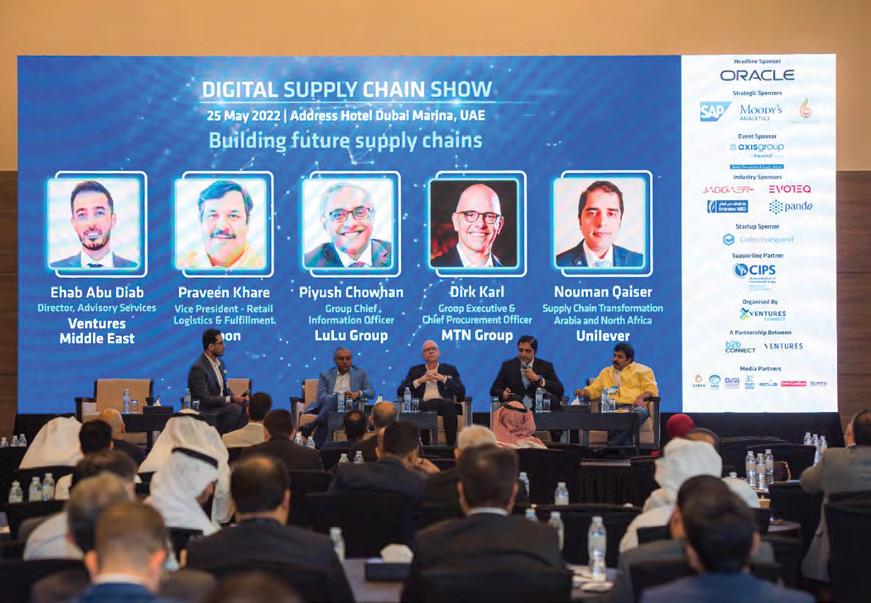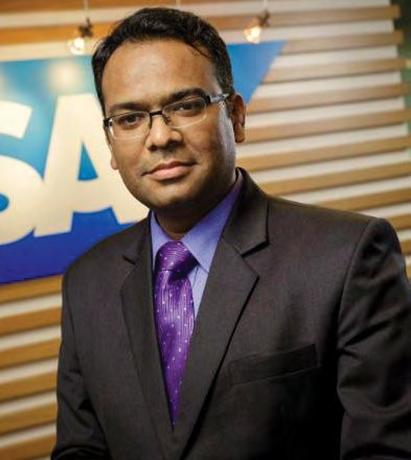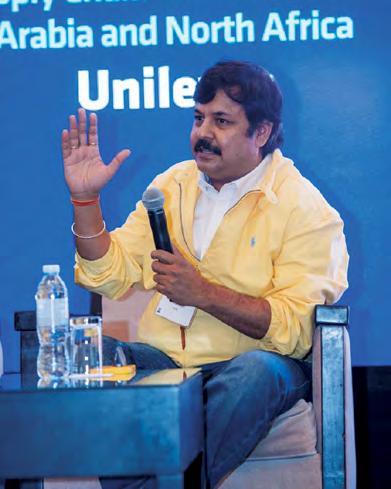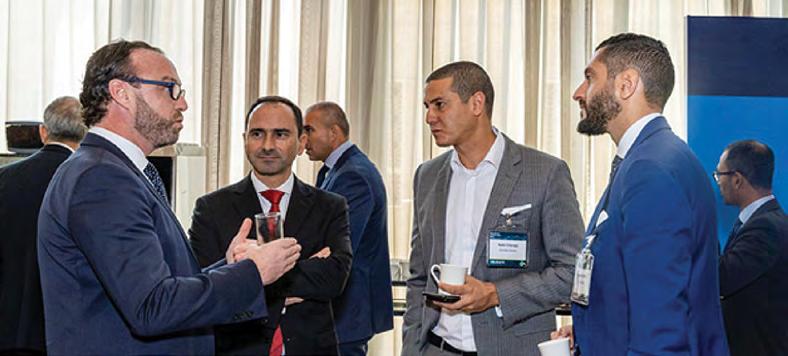
5 minute read
EVENT REVIEW
ADVANCED TECHNOLOGIES TO RESHAPE SUPPLY CHAIN SECTOR
Over 60 industry leaders shed light on ways to accelerate digitalisation and sustainability within the supply chain, logistics and procurement industry at the Digital Supply Chain Show
The third Digital Supply Chain Show concluded on Wednesday, 25th May at Address Marina, Dubai. The anticipated event saw the successful participation of more than 300 supply chain experts from across the MENA region.
Attendees and sponsors networked in person, reconnected with peers, and made new connections. Digital innovations that are accelerating visibility, efficiency, and predictability within the supply chain, logistics, and procurement industry were discussed at the event.
Organised by Ventures Connect and supported by CIPS MENA, the primary focus of the event was on how companies in the region can set up and implement supply chain and procurement processes for improved resiliency, agility, and sustainability.
Industry insights
The Digital Supply Chain Show offered real-world examples and practical insights from supply chain giants like Amazon, DP World, Noon, Unilever, Lulu Group International, Chalhoub Group, ADNOC Group, Emirates Airline, Saudi Telecoms Company, and Mondelēz International.
The practical examples demonstrated the efficiency gains possible when companies have a well-planned digital transformation and can access new knowledge by leveraging big data and technologies such as cloud, ERP systems, artificial intelligence, control tower and digital twins.

Ritesh Somani, Director, Supply Chain and 3PL Trans, Amazon MENA
Organisations have learnt in recent years the importance of de-risking their supply chains, especially if they are heavily reliant on one supplier or country. Digitalisation and data intelligence is giving companies new, faster insights that will support their decision-making.
“65% of the increase in price is due to supply chain issues globally and not because of demand issues,” says Dr. Ashraf Mahate, Chief Economist, Dubai Industries and Exports
Increasingly, multinational corporations and people are pledging to associate only with companies and brands who adhere to social and environmental standards. Companies are expected to have a highquality sustainability strategy in place that allows them to meet their carbon reduction targets. The Digital Supply Chain Show explored how to build resilient and responsible procurement and supply chain operations, working with supply chains to reduce indirect emissions.
Resilient digital supply chain
“Leveraging emerging technologies is critical for increased accountability, transparency and efficiency and is one of the first steps towards building agile and resilient digital supply chain transformations,” says Baljeet Nagi, Director of SCM Sales Development & Strategy, Oracle.
Speaking about the evolution of delivery and how each region differs. Ritesh Somani, Director, Supply Chain and 3PL Trans, Amazon MENA, shared how the variety of options offered by logistics and retail companies are adopting advanced
technologies to offer the customer the quickest and most efficient option.
“It is critical to use technology to be able to provide delivery choices to customer in a seamless manner. Whether it’s delivered to their car boot, doorstep, or a locker, they want to have that freedom of choice. This is where technology comes into play.”
He also discussed the global supply chain disruption, where getting things from point A to point B is becoming increasingly challenging. “What used to x days takes 1.4 to 2x days now. The challenge is how do you plan ahead with your vendors, manufacturers and suppliers, and use technology to ensure that once you get space on a container vessel or a cargo carrier, the inventory that you get is the right inventory - else that space is wasted.”
He added: “This is where technology comes into the picture: to be able to predict the future demand and ensure that the orders placed are worth getting in the first place. With technology, we’re now able to predict where and when products are needed.”

First-mile logistics
Praveen Khare, Vice President, Retail Logistics & Fulfillment at Noon. com highlighted how Noon.com is realigning the business to focus on first-mile logistics. “We’re going back
Praveen Khare, Vice President, Retail Logistics & Fulfillment, Noon. to the basics,” he said. “We’re taking into account all the learnings from the COVID-19 disruption. What is happening is no more merely a factory or port problem. “
He added: “What we’re try to emphasis on now is the project or container journey right from the time it enters the port to being placed on the vessel. It might look simple but it’s not the case. With the kind of blank sailing taking place everywhere, the entire supply chain needs to be re-calibered. Each vessel carries up to 20,000 of which 300 are mine, which means I need to also look at the sequence at which the containers are being offloaded. We’re focused more on creating visibility at the first mile of the business. If the base is correct, the rest is falls into place.”
The key to the success of the supply chain sector now lies with technology. Blockchain, machine learning and artificial intelligence are key to creating visibility, efficiency and agility. SAP MENA’s Abdul Hakeem, Regional Sales Head - Digital Supply Chain Solutions, believes that the next big thing for supply chain technology is networking.

Multi-directional collaboration
He elaborated: “The COVID-19 pandemic brought to the forefront the need for multi-directional collaboration. Looking at the current scenario, most customers are still in the uni-directional flow. For example: you send the order to the supplier, the supplier sends the stuff to you. There is no proper flow of collaboration on what you want to do versus what constraints they have.”
Abdul Hakeem, Regional Sales Head - Digital Supply Chain Solutions, SAP MENA
He added: “If we really want to build resilience, we need to transparently exchange information with suppliers and be aware of events that happen during the transit so we can respond accordingly. The disarray caused by COVID-19 was a deep tier disruption, supply chains didn’t have visibility.”
He also revealed that the two main challenges the sector is facing now are full visibility and the convergence of planning and execution. “Artificial intelligence and machine learning gets one to a significantly better place in terms of planning, but if one’s unable able to get a consistent data fabric and bridge the gap between planning and execution - then you’re not achieving much in object user resilience. Convergence is a crucial factor, and we’re try to address it at SAP.”






